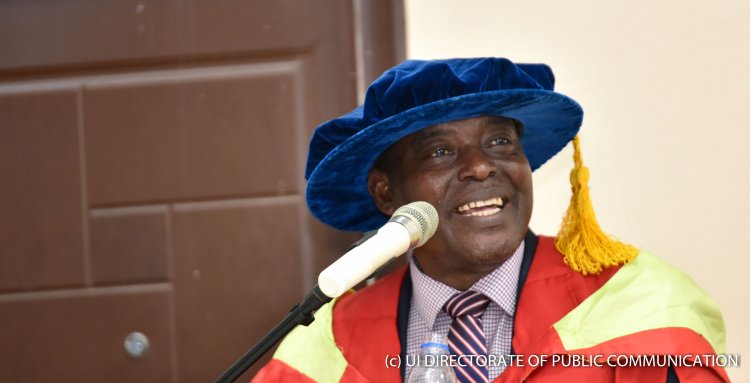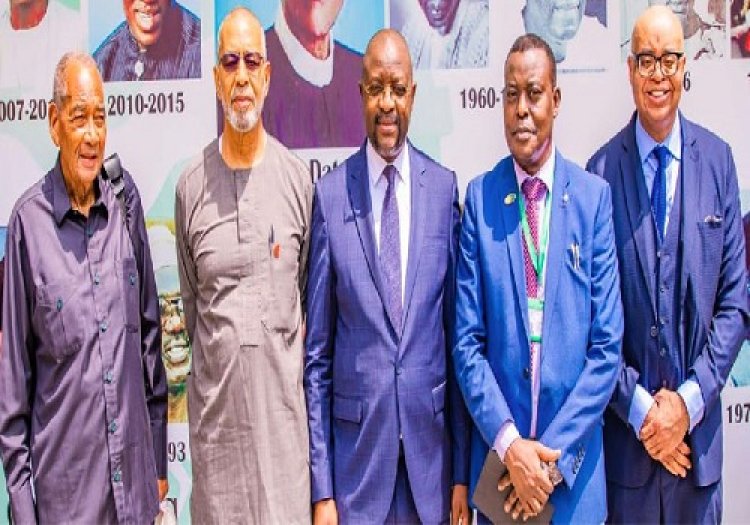The universality of sports makes it a veritable tool for diplomacy- Osaghae
The Director-General of the Nigerian Institute of International Affairs points the way forward for the country
Recently, the Director-General of the Nigerian Institute of International Affairs (NIIA) Eghosa Osaghae, a Professor of Political Science who was most recently Vice-Chancellor of Igbinedion University, Okada, held where egg heads from the diplomatic and sports community brainstormed on how the Nigerian government can use sports as a tool for diplomacy. DAVID MESHIOYE last month met the amiable professor in his office on Victoria Island. In this first part of the interview, he gave more insight into the idea.
In the diplomatic community and in academia Eghosa Osaghae the Director-General of the Nigerian Institute of International Affairs (NIIA) Eghosa Osaghae needs no introduction. Osaghae is to both communities what Zinedine Zidane is to football or Usain Bolt is to athletics.
But for the benefit of the member of the Sports Community, here is a snippet of Osaghae intimidating credentials.
A graduate of the prestigious University of Ibadan, Osaghae is a Claude Ake Chair at Uppsala University and Nordic Africa Institute, Sweden, and a Fellow of the Stellenbosch Institute of Advanced Studies in South Africa.
He was the 2017 Van Zyl Slabbert Professor of Politics and Sociology at the University of Cape Town and the 2014 Emeka Anyaoku Chair of Commonwealth Studies at the University of London.
In April 2014 became the first inaugural lecture by a Nigerian in the history of the University of London.
Between 1994 and 1998, he was a Professor and Head of the Department of Political Studies at the University of Transkei, South Africa.

He has also been a Visiting Professor/Fellow/Distinguished Senior Scholar at the Carter Centre of Emory University USA (1989), University of Liberia (1989/90), Salzburg Seminar, Austria (1993), University of Cape Town South Africa (1994), the Nordic Africa Institute, Uppsala Sweden (1994), University of Ulster, Northern Ireland (1999, 2000), Northwestern University USA (2002, 2004), University of Cambridge UK (2003), a number of universities and research institutes in India (2005, 2009), Dartmouth College USA (2005) and Yale University USA (2009).
Osaghae believes that sports universality makes it a veritable tool for diplomacy.
“The point about sports is that it is universal, it is global and this cut across all civilizations and generations. The history of every society is a history of sports and so many other things.
“Unfortunately, for a long time, people look at sports as recreation, maybe that was how sports appeared. Then sports took on a very active character of competition and competitiveness and therefore began to underscore the point of our rivalry.
“Then it became obvious to some of the users that sports can be used first to pursue one interest, I mean national interest, states and it can be used to defend one's interest.
“Most of all it can be used to promote human integration and shared humanity, it can be a tool for global harmony and the promotion of peace and security.
“Now, if you take them one by one, at a point where sports has become such a highly politicized terrain. You remember the Munich Olympics in 1972 which became an extension of politics by another means.
“You also remember the Montreal Olympics that came afterwards, the Commonwealth Games, and how boycotts became formidable political tools and extensions of politics and power play. You can see that sports have evolved over the years into a different dimension but also the intensity and the power it has.
“On the other hand, sports have become highly entrepreneur as some will say that sport is now a business terrain, it's almost central to everything else countries do. It is an industry that has a lot of money, it controls so a huge sum of money.
“It's just to see what the Premiership is doing for England as well as the impact World Cup is having on World's economy.
“Thirdly, sports have also become a social tool, it helps to unify people, and help to give people a character, an identity. It is in this regard that we look at what people have all over the world that we think sports diplomacy has become an assertion of black African space in the world. “People use guns but sports can be used because it's an area of numerical strength for African people in the diaspora not only in Africa but in Latin and North America itself.

“Sport is synonymous with black Africa. It's a turf we can use to our serious advantage first in pursuit of national interest and also in pursuit of our collective interest in Africa or global.”
For students at the University of Ibadan especially undergraduate and postgraduate students in the faculty of The Social Sciences in the late 1980s and early 1990s who were fortunate to drink from Osaghae’s fountain of knowledge, ‘he was just one of us’. If you have not attended any of his lectures before and he was seated and standing beside you and ask him, ‘My guy, that Dr Osaghae wey dey drop book from the head without reading from any book or note, you copy wetin he talk for last class’. You will be forgiven because Osaghae looked youthful like his students then.
Over three decades later Osaghae could still pass for a Jambite, so sir, what is the secret behind your looks?
“Frankly, we must take some forms of exercise seriously. I started life back as a goalkeeper in secondary school and in my University days. I was sharing with folks that one of the things sports taught me is how not to get angry. I learnt that as a goalkeeper, each time I get angry I became a loose basket. In sports psychology provocation is key; they taunt you and once you get angry then you are in trouble. Sports moderate your sense of competition with other people. Team sports like football help you to grow as a team player and someone who shares in the success of others. I can say that I was a proprietor and a coach of a football club in Benin and in Ibadan where I tried to raise a youth team as well. But how do I manage to do these things? Moderation.”
Keep a date with us on Thursday for the second part of our interview with Professor Osaghae.




















